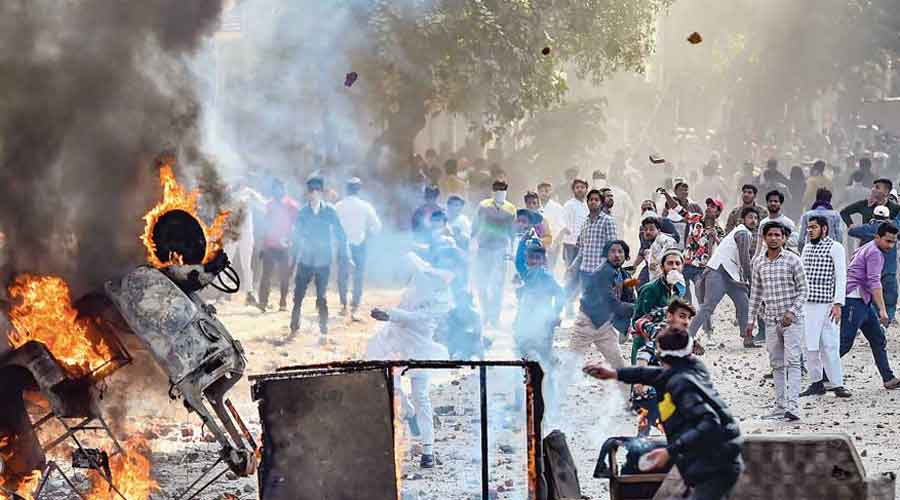A local court on Thursday jailed a man for five years in the first conviction over the 2020 Delhi riots in which 53 people lost their lives.
Prosecutors and witnesses said Dinesh Yadav was part of a mob of up to 200 rioters who vandalised and set fire to the house of a 73-year-old woman named Manori, New Delhi’s Karkardooma Court heard last month.
Yadav’s lawyer, Shikha Garg, said that apart from the jail term, the court on Thursday ordered the convict to pay a fine of Rs 12,000. “We will file an appeal before a higher court,” Garg said.
The riots, the worst such violence in the capital in decades, followed months of protests against the Narendra Modi government’s citizenship law that critics say discriminates against Muslims.
According to the prosecution, Yadav was an “active member of the riotous mob” and participated in vandalising and setting ablaze the house of Manori on the night of February 25.
Manori had alleged that a mob of around 150-200 rioters had attacked when only she was at home and looted all articles and even the family’s buffalo. She told the court that she was forced to jump off the roof of her home to save her life and hid in a neighbour’s house. Her family had later called the police to rescue her.
Yadav, 25, was arrested on June 8, 2020. The court framed charges against him on August 3, 2021, to which he pleaded not guilty and claimed trial. He was convicted on December 6.
Last month, additional sessions judge Virendra Bhat sentenced Yadav for being part of an unlawful assembly, armed rioting using a deadly weapon, trespassing, robbery and committing mischief using fire or an explosive substance with the intention of destroying a house.
In October 2020, the Delhi Minorities Commission had in a report accused Union home minister Amit Shah, Uttar Pradesh chief minister Yogi Adityanath and other BJP politicians of “fanning communal sentiments” through incendiary speeches before the February riots in the capital. The panel’s report also alleged that Delhi police, who answer to Shah’s ministry, “were complicit and abetted the attacks” during the riots and tended to arrest the victims rather than the people they accused.
One of the key charges in the panel’s report was that BJP leader Kapil Mishra, a former Delhi minister, triggered the riots through a speech in Delhi’s northeast Maujpur area on February 23.
Muslims were the worst sufferers of the violence, which began on the night of February 23 and continued till the afternoon of February 27.
The police’s probe into the riots came under the scanner last year with several retired judges saying that the investigation had “evoked extensive critical commentary in recent times”.
During the riots, several videos had surfaced purportedly showing the police supporting the rioters, either standing and watching the mobs run amok or, in some instances, accompanying them as they raided Muslim neighbourhoods.
Last year a trial court in Delhi had slapped a fine of Rs 25,000 on Delhi police for their “callous and farcical” investigation into one of the riot cases and said the force had “miserably failed in their statutory duties in the case”.
The Modi government passed the Citizenship Amendment Act (CAA) in 2019 to expedite citizenship for persecuted Hindus, Parsis, Sikhs, Buddhists, Jains and Christians who arrived in India before December 31, 2014, from Muslim-majority Afghanistan, Bangladesh and Pakistan.











